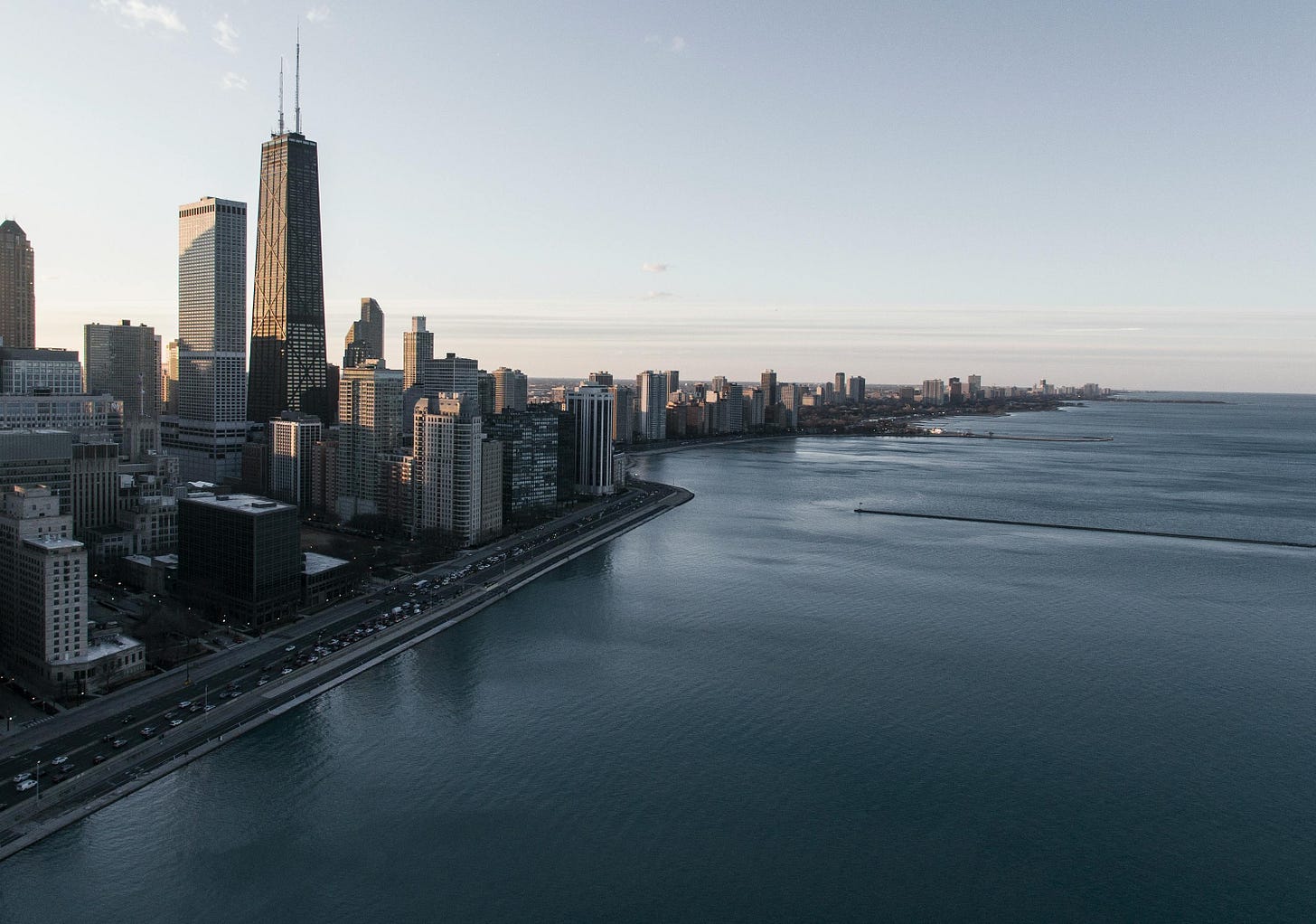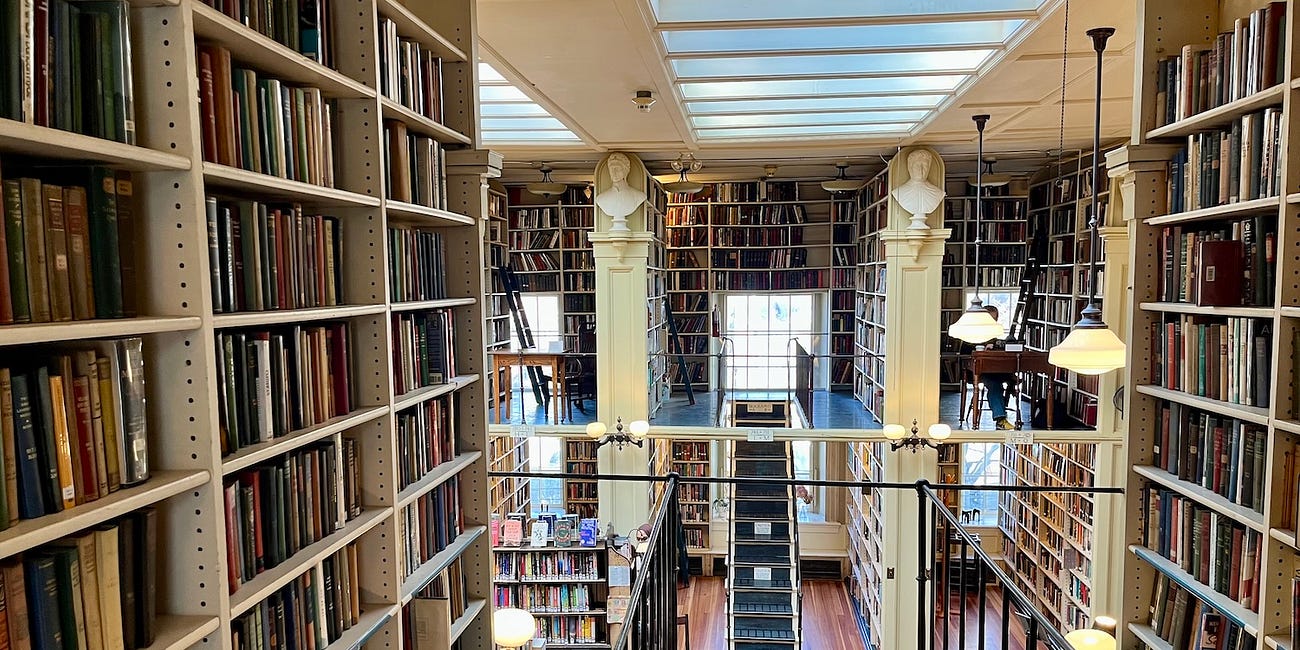Hi writer friends,
Today we have:
A moody lil essay about a couple years in Chicago.
Upcoming deadlines for grants, fellowships, and contests.
Upcoming events and education opportunities for writers.
In the Weeds: The words I’m tangled in this week.
Chicago is all train lines twisted in a knot of colors; a new city, a map. It’s taking one of those lines downtown, around and back without a destination, stealing glimpses into little windows on big buildings, catching moments of so many different lives, so many people you don’t know. It’s missing something you think you might find here.
It’s a navy blue sky and baby blue snow on early morning walks to the coffee shop where you first found work. The chunky snap of the register, the clang of dishes, the hiss and gurgle of the foam wand, the purr of the espresso machine. You liked the quiet, solitary tasks and the chaos that followed as the morning unfurled.
Chicago is the heat in your face when that boy who always came in like the wind with a book tucked under his arm finally asked where you’re from. It’s wanting to talk to him for longer, but not knowing how—not knowing how to make your face stop screaming red. How he smiled like he didn’t notice.
It’s needing more money, more friends, more time to write. How could you need more in a city of so much?
It’s finding a new job, at a bar this time, where the tips were bigger and the hours much later. The big back room packed with high-top tables that looked sticky in the light and felt sticky in the dark. It’s the taste of Red Bull dumped over flavored vodka, stout glasses stacked three high, everyone ordering them by the armful. It’s a customer offering you one, and a bartender offering you another, and the server who was training you explaining how to convince customers to buy you even more. It’s everyone tipping their heads back like they were swallowing the elixir of eternal youth, their faces bright and beaming when they came back down. But why would you ever want to stay so young? Even then, with the fire of vodka in your chest, you thought this seemed best if fleeting.
Chicago is the guy with the headphones in the booth, making everyone move together, the bass like a shared heartbeat. It’s him telling you about the woman who broke his heart. It’s the way he’d eventually make you want to run away and never see this city again.
Chicago is the early morning, below-freezing bite of the lakeshore wind on your face as you suck in icy air: miles 4, 8, 15. Slipping along the path, shuffling, finding your rhythm and your warmth. It’s going further and further and further until the music in your ears goes quiet.
It’s free tickets to shows and movies, thanks to an unpaid gig with a new city blog. You pour wine into the free water cups under the table at Chipotle with a new friend before you go. Laughing, doubled over, arm in arm on the city sidewalks—always running late. It’s going to all those free things to write about with this new friend whom you hope will be a friend for a very long time. It’s feeling like everything is yours and free, and also everything is impossibly expensive. It’s crying, curled up in your new friend’s bed, on one of the worst nights of your life, and knowing you’ll know her on the other side of all this.
It’s leaving Chicago in the silver hatchback you came in, with your stuff packed so tight you can’t see out the rearview window. The blur of the lake and the lights as you leave.
It’s going back, years later, skipping over the shifting shadows of lamp posts on your way to an old friend’s place in a neighborhood you once knew so well. You can’t remember how to get to that brownstone where you once rented a room. It’s going back to the coffee shop and seeing some of the same faces whose orders you knew in a past life; how they try to place you on this side of the counter but can’t. It’s the framed photo of an old friend, an old bar regular, on the wall of a new bar that’s packed with strangers. It’s wondering when he got sick and how long he suffered.
It’s a long walk in the sun in a city where you grew up a little, wishing you could go tell that girl that this place won’t be home forever, but it will be one of many she’ll always love.
It’s the lake, shimmering in the summer sun, looking like the ocean. You couldn’t believe it wasn’t the ocean back then. You still can’t.
Upcoming Deadlines
Orion Environmental Writers’ Workshop |Apply by TODAY
Waterston Desert Writing Prize | Submit by TODAY
Tom Howard/John H. Reid Fiction & Essay Contest | Submit by 5/2
Writer’s Digest Annual Writing Competition | Submit by 5/5
The Master’s Review Best Emerging Writers 2025 | Submit by 6/9
New! The Essential Voice Editorial Fellowship | Apply by 7/2
Events and Education
Paula Perhach and Ruthie Ackerman present Write Your Mother Code Story, an online workshop about motherhood, identity, and writing, on 5/6. It’s free!
How to Write About Social Issues in Unprecedented Times is something we should all be thinking about. Narratively presents this workshop with author Kavita Das on 5/7. $140.
Elastic Magazine is having a launch party in Brooklyn on 5/8.
Thinking about Book Passage Travel Writers and Photographers Conference this year? I am! It’s a ways out but time to put it on your radar.
In the Weeds
Words I’m tangled in this week…
An essay by Krista Ohlson on the connections and conversations found on long walks, for Oregon Humanities:
on the importance of educating ourselves on the wildlife we live alongside, for Earth Island Journal:I always feel as if we’re carving a new little groove with every walk—drawn down one street by a glimpsed mural on the side of a building, bypassing another street where a new mushrooming of tents has narrowed the sidewalk, beguiled to another by a trail of blossoms someone arranged on a stone wall—and then often discover that we have been this way before. Part of the pleasure every day is getting slightly lost— distracted by the visual changes of the passing seasons and the conversations that sometimes make us lose track of where we are—and then found, in our more intimate familiarity with the larger neighborhood.
Every pupping season, the same problems recur, and the same people demand coyote “removal.” Since a coyote’s territory can range up to 60 square miles, it seems to me that educating ourselves about basic coyote behavior would be a better option.
Besides, having these animals around is actually beneficial. A single coyote can eat over 1,000 rodents a year — a better pest control solution than the slow, painful poisons that can kill non-target wildlife as well. Coyotes keep other animals, like rabbits, deer, and Canada geese, in check too. They also clean up carrion. All that good work goes unnoticed, at least by most of us, and so we lose good neighbors to fear.
One more thing
Did you catch last week’s post with a bunch of tips on how to find story ideas when you’re stuck?
31 Things To Do When You're Out of Ideas
At the start of last week, I was sure I’d never have another good idea. I was donezo. Swirling news of tariffs and impending financial crisis sent me into a whirlwind of anxiety from which all creative thoughts were blown away. There would never be another assignment, another byline, another paycheck.
That’s all for today, friend! If you liked this post, it would mean a lot if you a hit the heart up top or forwarded it to a writer friend. Thank you, as always, for your support.
Stay inspired,
Britany





Speaks to me with similar memories of Manhattan.